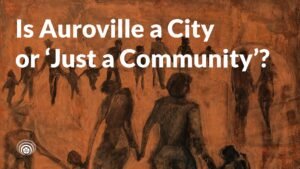The whole earth is now under one law and answers to the
same vibrations and I am sceptical of finding any place where
the clash of the struggle will not pursue us. I must remain
in touch with the world until I have either mastered adverse
circumstances or succumbed or carried on the struggle
between the spiritual and physical so far as I am destined to
carry it on. This is how I have always seen things and still see
them. As for failure, difficulty and apparent impossibility I am
too much habituated to them to be much impressed by their
constant self-presentation except for passing moments…
One needs to have a calm heart, a settled will, entire self
abnegation and the eyes constantly fixed on the beyond to live
undiscouraged in times like these which are truly a period of
universal decomposition. For myself, I follow the Voice and
look neither to right nor to left of me. The result is not mine
and hardly at all now even the labour.
The earliest preoccupation of man in his awakened thoughts
and, as it seems, his inevitable and ultimate preoccupation, —
for it survives the longest periods of scepticism and returns
after every banishment, — is also the highest which his thought
can envisage. It manifests itself in the divination of Godhead,
the impulse towards perfection, the search after pure Truth
and unmixed Bliss, the sense of a secret immortality. The
ancient dawns of human knowledge have left us their witness
to this constant aspiration; today we see a humanity satiated
but not satisfied by victorious analysis of the externalities
of Nature preparing to return to its primeval longings. The
earliest formula of Wisdom promises to be its last, — God,
Light, Freedom, Immortality
The first step is Karmayoga, the selfless sacrifice of works,
and here the Gita’s insistence is on action. The second is
Jnanayoga, the self-realisation and knowledge of the true
nature of the self and the world, and here the insistence is
on knowledge; but the sacrifice of works continues and the
path of Works becomes one with but does not disappear into
the path of Knowledge. The last step is Bhaktiyoga, adoration
and seeking of the supreme Self as the Divine Being, and
here the insistence is on devotion; but the knowledge is not
subordinated, only raised, vitalised and fulfilled, and still the
sacrifice of works continues; the double path becomes the
triune way of knowledge, works and devotion. And the fruit of
the sacrifice, the one fruit placed before the seeker, is attained,
union with the divine Being and oneness with the supreme
divine Nature.
The spirit and ideals of our civilisation need no defence for in
their best parts and in their essence they were of eternal value.
India’s internal and individual seeking of them was earnest,
powerful, effective. But the application in the collective
life of society was subjected to serious reserves… And now
survival itself has become impossible without expansion. If
we are to live at all we must resume India’s great interrupted
endeavour; we must take up boldly and execute thoroughly
in the individual and in the society, in the spiritual and in the
mundane life, in philosophy and religion, in art and literature,
in thought, in political and economic and social formulation the
full and unlimited sense of her highest spirit and knowledge.
The integral Yoga takes up the essence and many processes of
the old Yogas — its newness is in its aim, standpoint and the
totality of its method.
It is new as compared with old Yogas…
- Because it aims not at a departure out of world and life into
Heaven or Nirvana, but at a change of life and existence, not
as something subordinate or incidental, but as a distinct and
central object. - Because the object sought after is not an individual
achievement of divine realisation for the sake of the individual,
but something to be gained for the earth consciousness here,
a cosmic, not solely a supracosmic achievement. The thing to
be gained also is a bringing in of a Power of Consciousness
— the Supramental. - Because a method has been preconised for achieving this
purpose which is as total and integral as the aim set before it,
viz., the total and integral change of the consciousness and
nature, taking up old methods but only as a part action and
present aid to others that are distinctive… Our Yoga is not a
retreading of old walks, but a spiritual adventure.




